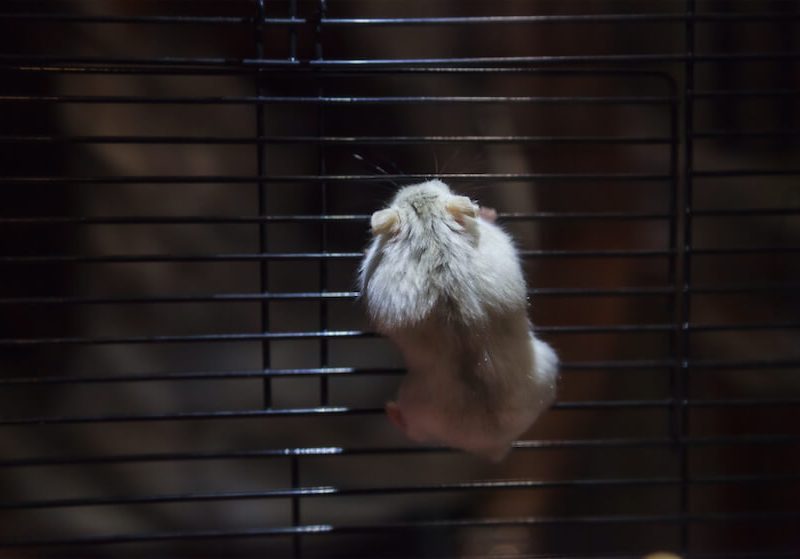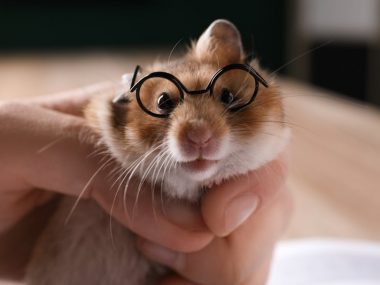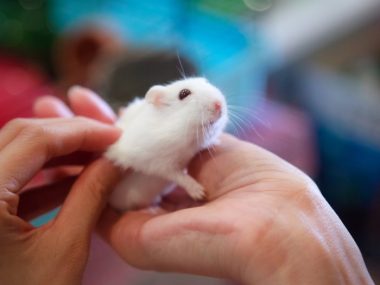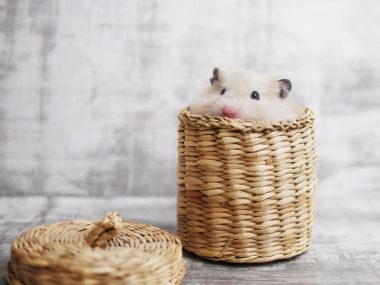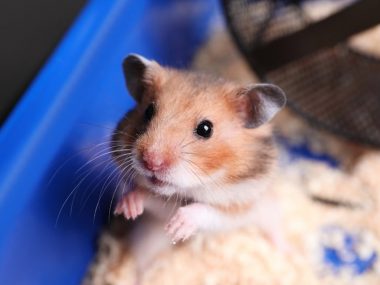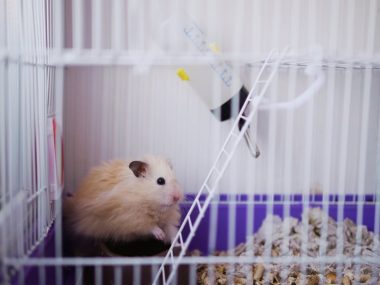While we snooze the night away, hamsters are “going to town” in their cage. As the sun sets and we settle our heads on a soft pillow, the engine inside our hamster is revving up for a night of fun. Curious to find out why hamsters are nocturnal creatures? Here’s our data-backed deep dive.
Table of Contents
Are Hamsters Nocturnal Animals?
Yes, they mostly are. Through the period of evolution, hamsters have chosen to become active at night as means of self-preservation. Rodents (mice, rats, hamsters, etc.) are preyed upon by hawks, owls, eagles, snakes, felines (cats, bobcats, etc.), and many other animals. The dark of night allows an element of protection for hamsters to go out and forage for food.
But to better understand why even pet hamsters are nocturnal, let’s get a tad deeper into biology. It’s going to be fun, promise!
What Is Nocturnal?
Nocturnal is a term used to describe an animal that is active at night. Nocturnal animals (that include hamsters) sleep during the day and come to life at night.
There is a whole world of active time classification when it comes to the animal world. Just to give you an idea, an animal can be diurnal, nocturnal, crepuscular matutinal, crepuscular vespertine, or cathemeral. All are used to describe when animals are active.
To help you better understand why hamsters are active at night, it helps to glimpse into why other animals are active when they are. Animal activity times occur when they do because of a rhythm nature has to work harmoniously in when it comes to waking and sleeping.
Diurnal — Daytime Active Animals
Diurnal animals are those who (like humans) are active during the day and sleep at night. These types of animals depend on daylight hours because their eyesight does not function in the dark.
Some of these animals include:
- Turtles
- Eagles
- Hawks
- Elephants
- Butterflies
- Honey Bees
- Dogs
Crepuscular Vespertine — Sunset Active Animals
Animals who begin to come to life after a full day of sleeping typically continue activity through the night. Those who begin to stir and liven up as the sun starts to go down and who continue through the night are both crepuscular vespertine AND nocturnal.
Some of these animals include:
- Rodents (mice, rats, hamsters, gerbils, guinea pigs, etc.)
- Bears
- Skunks
- Snakes
- Bats
Nocturnal — Nighttime Active Animals
Animals who are most active at night are nocturnal. This behavior continues until early morning, just before the sun comes up and a little past sunrise.
Some of these animals include:
- Rodents (these fellows do both ways)
- Owls
- Aardvarks
- Raccoons
- Possums
- Coyotes
- Skunks
- Badgers
- Pangolins
- Tigers
Crepuscular Matutinal — Sunrise Active Animals
Predawn animal activity occurs just before the sun comes up. Some nocturnal animals are winding down their all-night activity, while others may hide during the night and begin to come alive during this period and part of the forthcoming daytime.
Examples of mostly sunrise active animals include:
- Housecats
- Rabbits
- Ferrets
- Jaguars,
- Wombats
- Wallabies
- Hyenas
Cathermeral — Active Time Varies
Animals who don’t seem to have any particular time of day or night when they are active fall into this group.
Some of these animals include:
- Lions
- Koalas
- Bobcats
So Are All Hamsters Nocturnal?
A hamster, whether wild or captive, is primarily active at night (nocturnal) due to its instincts. Also, most pet hamster doesn’t know the difference between being in a protective environment or out in the wild. Thus, they preserve the same habits.
Which Hamsters Are Not Nocturnal?
All hamsters are nocturnal. However, dwarf hamsters tend to stir around a bit more during the day compared to their counterparts. A Syrian hamster (for example) may move to get comfortable or get a drink of water during the day but sleeps the majority of the day away. Dwarf hamsters may have daytime stretches where they sleep with a few intermittent times of playing, eating, or moving about.
Is It Bad If My Hamster Sleeps At Night?
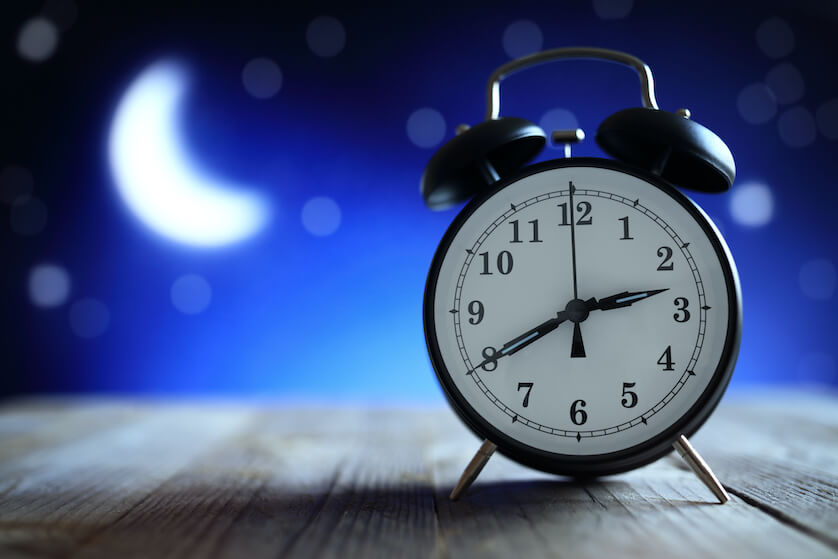
Not at all. But if you find that your hamster constantly snoozing through the night, there are two possible reasons for this. It may be hibernating or ill. Most pet hamsters don’t hibernate, but under certain conditions, they may.
Hibernating pet hamsters do so because they:
- Feel cold. This is often the case if the hamster cage is near a drafty air vent, exterior door, window, or the heat is too low.
- Are lonely and have not had any interaction with their owner in days. Going away on vacation without someone to interact daily with your hamster can cause them to hibernate.
- Lack nutrition. When a hamster is not being properly fed, its natural instinct is to switch to hibernation as a means to save energy.
- Lack of light. Being kept in a very dark room 24 hours a day can disturb the hamster’s sleeping patterns.
After ruling out any possible reasons for hibernation, it might be time to contact the veterinarian to have your hamster examined.
Do Hamsters Need A Light On At Night?
Hamsters instinctively move about in the dark of night in the wild without any light. Whether they are out in the wild or living in a cage, a light is not necessary. Darkness during their most active time is preferred. Introducing light during this time is disruptive.
Is It Ok To Wake Up A Hamster?
This is a great question! Unless you’re brave enough to poke a sleeping bear, we would not recommend waking a sleeping hamster. The sudden jolt of feeling threatened puts them into overdrive when woke up, and if your hand is near them, you may be bitten. If you need to wake your hamster up for any reason, it’s best to start by talking to them. A very light touch may help. But to suddenly pick them up and start petting them will most likely cause a negative reaction.
Should I Cover My Hamster’s Cage At Night?
There’s no need to cover a hamster’s cage day or night. The only time any type of coverage might be needed is if you are carrying them (in a portable cage) to the vet and it’s cold outside. Other than that, just let your hamster enjoy the daily sunlight and rustle about their business at night.
Hamsters “Party All Night”
Knowing that your hamster burns the midnight oil before placing their cage in your bedroom may save you from lack of sleep. We can guarantee you that the hamster wheel will be going all night, and you may hear the occasional clunk or squeak. If you’re looking for a pet to cuddle with during the day, a hamster isn’t the one.
